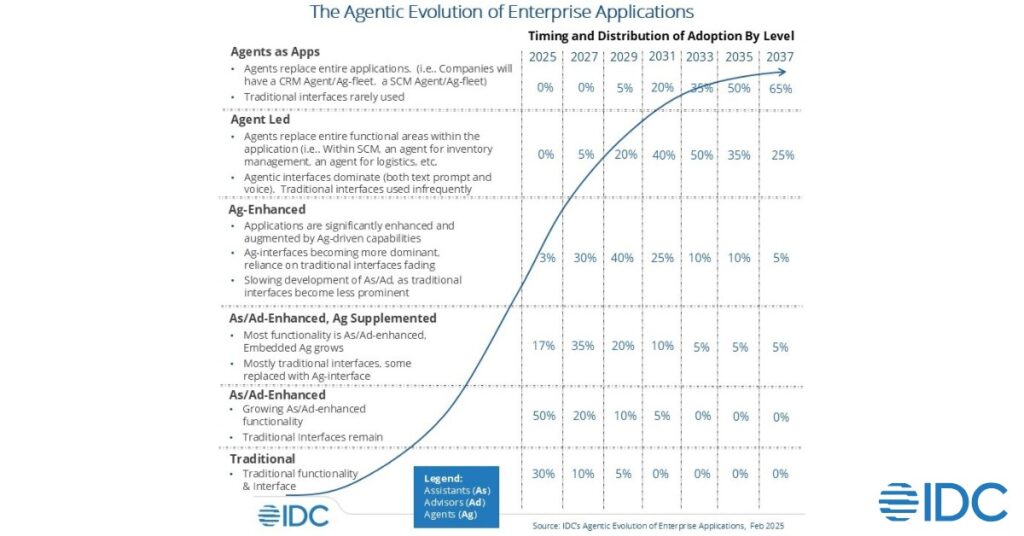Generative and agentic AI have begun to completely transform how enterprise applications are designed, delivered, and engaged with by users.
AI assistants that work reactively and cooperatively with humans to provide productivity and efficiency gains, as well as AI advisors that provide enhanced insights and recommendations to organizations, have both quickly become must-haves in modern software.
AI is helping to transform software solutions that have historically been passive tools, into active decision-making partners, through advancements in machine learning, natural language processing, LLM development, and widespread generative AI advancements.
IDC estimates more than 50% of the enterprise application market is already AI assistant or AI advisor-enhanced, with most software solutions now offering at least some level of these embedded capabilities. Beyond this, approximately 20% of the market is also now further supplementing their applications with complete AI agents.
These agents are independently perceiving, evaluating, and acting upon data, helping to move organizations toward more integrated and autonomous work practices.
The Agentic Shift
While AI assistants and advisors rule the day, AI agents are going to win the race, and we are only a few short years away from this pivot occurring. Over the next 3-4 years, generative and agentic AI advancements will help push enterprise applications to a state where most offerings available will be significantly enhanced and augmented by agent-driven capabilities. Agent-driven interfaces will become more dominant, and reliance on traditional interface and UI design will begin to fade. This will result in slowing development of AI assistants and advisors, and a more prominent focus on text prompt and voice-based user engagement.
This evolution in software will ultimately result in most enterprise applications evolving to become agent-led, where agents replace entire functional areas within the application. For example, within supply chain management (SCM), we will see an agent for all inventory management responsibilities, another agent for logistics, and so on, and the traditional interfaces in enterprise software that we have grown accustomed to over the last two to three decades will become less frequently used.
Eventually, we foresee agents taking the next logical step and replacing entire applications, with this phase likely starting to ramp up more significantly by the early 2030s. For instance, we will see companies enlisting an SCM agent, or possibly an entire fleet of SCM agents, instead of traditional SCM software. The same will occur in other functional markets, such as a CRM agent/agent-fleet, HCM agents, EAM agents, finance agents, etc.
In IDC’s recent Future Enterprise Resiliency & Spending (FERS) Survey, which polled nearly 900 companies during February 2025 about the impact they expect AI agents will have on their enterprise app investments, more than 80% of companies said they believe “AI agents are the new enterprise apps, triggering reconsidering of our investments in packaged apps”.
Vendors Must Keep Pace to Remain Relevant
With this agentic shift looming on the horizon, it is extremely important that software vendors pay close attention and keep pace to ensure that they remain relevant and competitive. Traditional barriers to entry into enterprise application markets will be increasingly challenged by a new era of software solutions that are designed as agents and are quicker, easier, more effective, and more intuitive to use than conventional software.
Dozens of agentic startups will aim to compete and win market share from traditional software vendors, and “agents as apps” will open the door for a new generation of enterprise application competition. Likewise, platform vendors will look to overlay agent capabilities on top of, and across applications, as they too try competing further up the stack. Results from IDC’s FERS survey further support this notion, with 83% of companies stating they believe “AI agents create a new intelligence layer over apps, eliminating barriers to switching between suppliers”, and 76% of companies confirming that “AI agents mean we are more likely to consolidate our enterprise app suppliers”.
Now is the time when today’s incumbent enterprise software vendors should already be planning for this agentic shift, formulating a product roadmap transformation strategy and timeline that will keep pace and proactively protect their portfolio and market share over the next 5-10 years.
To help software vendors envision this journey more clearly, including its expected timing and the steps through which applications are set to evolve, IDC has published its framework for the agentic evolution of enterprise applications, which is shown in the figure below. The diagram shows both the phases through which we expect software to evolve, as well as our estimated distribution of adoption timeline This illustrates how quickly enterprise software is currently expected to make this agentic pivot.
Where does your organization currently fall on this journey? Have you already designed your product roadmap to become agent-led? Have you evaluated your competitive differentiation to ensure its sustainable and defendable throughout this agentic pivot? Let us know, we would love to hear from you!





